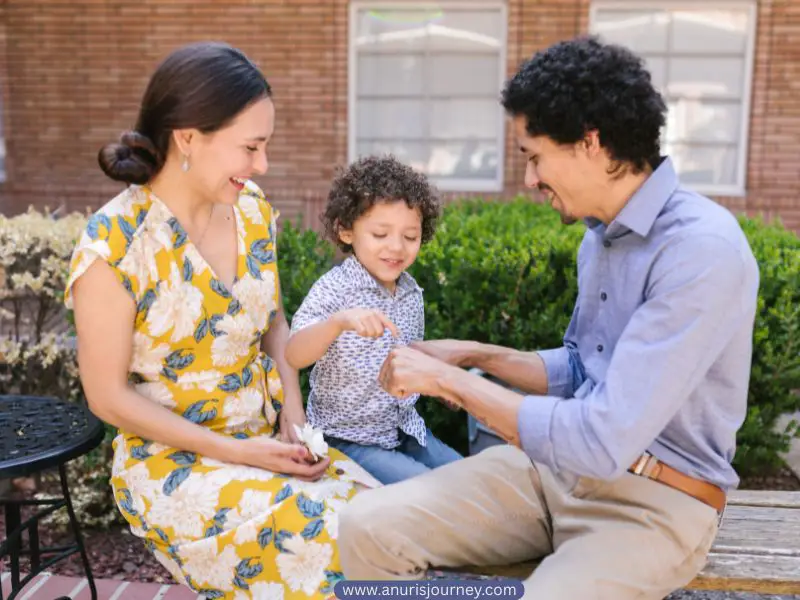Are you a parent, who desires to raise well behaved kids? I have put together this post on How to teach kids manners without being too strict.
My heart is always filled with joy when my toddler, Nora, says “thank you ma, thank you sir” after family meals.
There is nothing that makes a parent proud than having kids who know how to act right, be nice to people, and use simple, polite words like “please” and “thank you.”
As parents, we want them to make good first impressions, get along with others and be considerate on how their actions affect the people around them.
We want them to have more than just surface level politeness but be able to truly connect with people, build lasting friendships, handle life’s challenges with grace, and grow into genuinely kind and good-hearted individuals.
Don’t forget that kids’ minds are so impressionable; what you teach them now will likely become a lasting part of them.
However, teaching a child to be good-mannered is a complex and ongoing process, less like a quick fix and more like nurturing a seed into a strong plant.
We may think that being too strict with kids when teaching them manners is the best, but that can lead to resentment, fear and a focus on simply avoiding punishment rather than truly learning the values behind good manners.
The secret to well-mannered kids isn’t strict rules, but more about helping them put themselves in other people’s shoes and get why being polite is important.
So here are some tips and ways to teach Kids Manners Without Being Too Strict. It worked for me and it can work for you too.
The importance of Teaching Manners

You see, teaching our kids good manners isn’t just about making sure they say “please” when they want something and “thank you” when they get it.
It’s actually about building a strong foundation so that they can easily connect with people, understand their own feelings, the feelings of others, and learn what’s right and wrong. Other reason we teach manners to our kids are:
- To Provide the kids with a background to interact respectfully and effectively with others, knowing how to greet people, make introductions, and engage in polite conversations.
- So that they can be able to make good first impressions on teachers, peers, and other adults. This can open doors to friendships, opportunities, and lasting relationships.
- To let them know how to act, the right way in different situations. For instance how to be respectful, even when you don’t agree with someone and in similar situations.
How to Teach Kids Manners Without Being Too Strict
1. Don’t underestimate the Power of Parental example

Parents are a child’s first and most influential role models. From the moment they are born, they are constantly watching how we behave, and communicate.
They are meticulous observers, noticing not just what you say, but how you say it, your tone of voice, your body language, and the way you treat people.
For example:
- When you constantly say “Please Have a glass of water?”, “Thank you for helping me.” and you also prompt others with “Please…” and respond to their actions with a sincere “Thank you.”, they will learn that these words are the standard way to make requests and express gratitude.
- When you greet neighbours with a cheerful “Good morning, Aunty/Uncle!”, or say “Good afternoon, Ma/Sir” to shopkeepers, and bid farewell with a clear “Goodbye, see you later” or “Good night.”. They will understand that acknowledging others with a greeting shows respect and awareness of their presence.
- When you chew with your mouth closed, use your cutlery appropriately, avoid talking with your mouth full, say “excuse me” if you need to leave the table, and refrain from reaching across others. They learn the unspoken rules of dining etiquette and understand that good table manners are a sign of respect for the food.
- When you listen attentively when someone is speaking, avoid interrupting, speak in a respectful tone even when disagreeing, and show consideration for other people’s opinions and feelings. They understand that everyone deserves to be heard and that disagreements can be handled calmly and respectfully and so on.
The most powerful and lasting way to teach our children good manners is by consciously living those behaviours ourselves.
2. Start Young and Keep it Simple
It is very important that we understand that kids at different ages develop understanding for society at different rates.
Expecting a very young child to adhere to the same etiquette as a teenager is not only unrealistic but can also lead to frustration for both the child and the parent.
So know what behaviour to expect based on your kid’s age.
It is very important to start early to teach them manners because Habits, both good and bad, begin to form early in life making it easier for them to learn and internalize new behaviors, including good manners.
Speak their language and keep it simple. Use words they understand and can relate to their everyday experiences. “Please” for getting things, “thank you” for receiving things, “hi” and “bye” for greetings and farewells. Avoid abstract terms or complex explanations.
For young children, learning should feel like play. This makes the lessons stick.
You can use songs, role playing games, and storytelling to help them interact with you. The key is patience, consistency, and understanding that they are still learning and developing their social skills.
3. Show them the right path with kindness

This is shifting the focus from what the child did wrong to helping them understand what they could do right in future.
See mistakes as chances to learn and grow. When your child forgets their manners, instead of jumping straight to scolding, take a breath and see it as a chance to gently go over what they should have done.
When a mistake happens, involve the child in finding a better way to handle the situation next time. Ask questions like, “What could you do differently next time?”
Spend time teaching manners in calm environments, rather than only addressing them when mistakes occur. You can role-play scenarios, discuss expectations beforehand, and make it a part of your everyday conversations.
When they know what you expect from them, it reduces the likelihood of mistakes and provides a standard for them to follow.
4. Explain the “Why” Behind Manners in a Way Kids Can Understand
Just telling a child ‘do this’ or ‘do that’ often doesn’t really work. But when you take a moment to explain why saying ‘please’ or waiting your turn matters, and how it makes others feel, it works better for them.
Connecting good manners to how they see the world and how they interact with people makes it feel more important and makes them want to be polite.
For instance: “Saying ‘please’ shows you respect what someone is doing for you and makes them feel appreciated and makes them more willing to help.” Or, “When you interrupt someone speaking”, it can make the person talking feel like what they are saying isn’t important, and that can be hurtful.”
Just like they need to hear ‘please’ and ‘thank you’ over and over to remember the words, understanding why we say them also takes time and practice.
Keep gently reminding them of the reasons behind good manners in different situations.
When we clearly explain why manners matter in a way kids get, they learn to truly care for others, not just because they’re told to.
5. Use Praise and Rewards to Grow Good Manners

Praising good behaviour is a powerful parenting tool and a strong way to teach kids manners without being strict. It encourages them to do it again, unlike just focusing on what they did wrong.
This helps build their self confidence and makes them want to do it again and again.
“Instead of just saying ‘Good job!’, try being more specific. Tell your child exactly what you liked about what they did.
For example, you could say, ‘I really liked how you waited your turn so patiently during the game. That showed your friend you were being fair.’ This helps them understand why their action was good and makes your approval much clearer.
Kindly offer small rewards or privileges. A sticker, extra playtime, or a special treat can reinforce positive behaviour, especially for younger children.
6. Be Consistent but Flexible
Know that kids will definitely have off days and make mistakes. While doing things the same way consistently is really important, we also need to know that kids are still growing and figuring things out.
Just like us adults, they’ll have days when they’re tired, hungry, feeling grumpy, or just not in a good mood. On those days, they may struggle to remember and adhere to them.
As parents, we may likely overreact and scold when there are minor mistakes in manners and this can strain parent-child relationships. So please be patient with them.
Being patient in such situations actually teaches them compassion. They learn how to be kind and forgiving towards themselves when they struggle. When you respond to their slip-ups with gentleness, you’re showing them how to treat themselves with that same kindness.
This is a really important skill for them to learn as they go through life, helping them bounce back from challenges and be kinder to themselves.
Be consistent and tell all your caregivers as well to avoid contradicting instructions.
Imagine a child learning to tie their shoelaces. If one day the instruction is “make a loop,” the next it’s “make a bunny ear,” and a third caregiver says “just tie a knot,” the child will likely be confused and struggle to understand which one to adhere to.
7. Turn Everyday Moments into Learning Opportunities

Integrate teaching children manners in everyday moments, instead of giving lectures or long sermons.
Be mindful and intentional during your daily routines and interactions. Instead of letting moments pass by, tell them the manners that apply to the situation, guide your child in practicing them, and discuss the effect of their behavior on others.
For example, you’re standing in line, maybe at a shop or for a service, and your kid tries to go in front of others. Gently explain that everyone has to wait their turn, emphasizing that it’s a way of being considerate and acknowledging that everyone is waiting for their turn.
8. Avoid Shaming and Public Scolding
When a child misbehaves, our immediate reaction is to scold or yell to quickly correct such behaviour. But responding in such ways has a huge impact on the child’s self esteem and relationship with us.
Choose to correct your child privately and calmly, while focusing on what they did rather than using words like “bad, wicked”. It is a much better way to help them truly learn good manners that will stick.”
Avoid Public shaming as this can be deeply damaging to a child’s sense of self-worth. Being called out or ridiculed in front of others (siblings, friends, strangers) can lead to feelings of embarrassment and humiliation.
But addressing mistakes privately tells the child that you care about their feelings and are trying to help them learn, not just punish them.
When we publicly shame a child, we are in turn modeling a behavior that we likely don’t want them to emulate, which is treating others with respect, even when they make mistakes, and that is a crucial lesson in itself.
So, the key to raising well-mannered kids without being overly strict lies in showing them the way through your own actions, starting small, explaining why manners matter, and being consistent yet understanding when they slip up.
This sets them up to have good relationships and succeed in whatever they do, both as kids and when they’re older.
You may also see:
The Best Time Saving Cleaning Hacks for Busy Moms
What to do if you feel like you’re failing as a mom
How to keep your house from looking like a Toy Store exploded